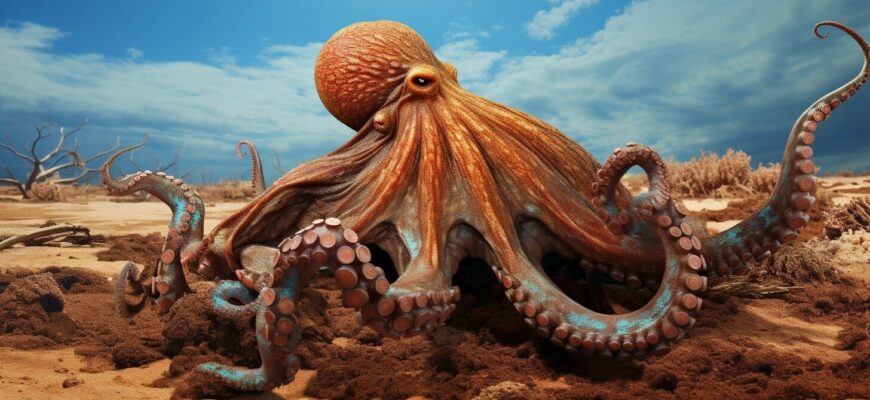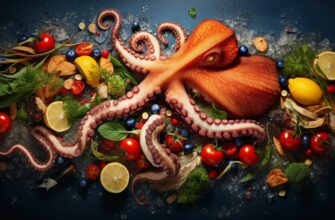Have you ever wondered how long an octopus can survive outside of water? These fascinating creatures are known for their ability to adapt to various environments, but how long can they truly tolerate being out of their natural habitat? In this article, we will explore the respiratory system and adaptations of octopuses that allow them to tolerate short periods of time on land, as well as their actual duration of survival outside of water.
- Octopus Respiratory System and Adaptations
- Adaptations for Land Survival
- How Long Can Octopuses Stay Out of Water?
- Can Octopuses Survive on Land?
- Survival Strategies of Land-bound Octopuses
- Additional Adaptations for Survival
- Longest Recorded Time for an Octopus Out of Water
- Potential Consequences of Prolonged Time out of Water
- FAQs about Octopuses Living Out of Water
- Can all octopuses survive out of water?
- How long can an octopus stay out of water?
- What adaptations do octopuses have for surviving out of water?
- What are some survival strategies land-bound octopuses use?
- What are the risks of prolonged time out of water for octopuses?
- Why do octopuses come on land?
Octopus Respiratory System and Adaptations
Octopuses have a unique respiratory system that allows them to breathe both in water and on land. Their gills are their primary respiratory organ when in water, but they can also rely on their lungs to breathe air.
Octopuses use a mechanism called buccal pumping to move water over their gills. They draw water into their mantle cavity and then force it out through their siphon. As the water passes over their gills, oxygen is absorbed into their bloodstream.
When octopuses are out of water, they can still extract oxygen from the air using their lungs. Their lungs are made up of thin-walled sacs that are connected to the mantle cavity. These sacs are surrounded by blood vessels, which allows oxygen to diffuse into the octopus’s bloodstream.
Adaptations for Land Survival
In addition to their respiratory adaptations, octopuses have several other mechanisms that help them survive when out of water. They have been observed using their arms to crawl or “walk” short distances on land. They also have the ability to change their skin color and texture in order to blend in with their surroundings. This helps them avoid predators and stay hidden from potential prey.
Octopuses have been known to seek shelter in rock crevices and other moist areas to maintain moisture and avoid dehydration. Additionally, some species of octopuses have been observed carrying shells or other objects with them, which they use to create a protective covering or shelter.
How Long Can Octopuses Stay Out of Water?
Octopuses are known for their remarkable ability to survive outside of water for short periods of time. However, the actual duration that they can stay out of water depends on various factors, including species, size, temperature, humidity, and environmental conditions.
Generally, smaller species of octopuses are more tolerant of being out of water, while larger species can only survive for a few minutes or hours at most. The common octopus, for instance, can survive for up to 30 minutes outside of water under optimal conditions, while the coconut octopus can survive for several hours by carrying a coconut shell filled with water and moistening itself periodically.
Temperature and humidity also play a crucial role in the survival of octopuses outside of water. They are cold-blooded animals that rely on their environment to regulate their body temperature and moisture levels. If the temperature is too high or too low, or the humidity is too low, it can cause dehydration and other physiological stress that can lead to death.
Other environmental factors that can affect the survival of octopuses outside of water include air exposure, salinity levels, and predation risk. For example, if an octopus is exposed to air for too long, it can damage their gills and respiratory system, causing suffocation.
Therefore, while octopuses have evolved some amazing adaptations that allow them to survive outside of water, such as specialized skin that can change color and texture to blend in with their surroundings, they are still primarily aquatic animals that require water to breathe and maintain their bodily functions.
Can Octopuses Survive on Land?
While some species of octopuses are better adapted to tolerate short periods of time outside of water, no species of octopus is fully adapted to life on land. They lack the structural support and mobility needed to move efficiently on land, and their respiratory system is optimized for gas exchange in water, not air.
Therefore, while octopuses can survive for short periods of time outside of water, they are not equipped to live permanently on land.
Survival Strategies of Land-bound Octopuses
When stuck on land, octopuses use a variety of survival strategies to cope with their challenging circumstances. One of the most remarkable mechanisms they employ is their ability to change color and texture to blend in with their surroundings, a skill known as camouflage. Land-dwelling octopuses can rapidly alter their skin pigments and texture to match the color and pattern of the ground, rocks, and vegetation around them. This allows them to remain undetected by predators and increases their chances of survival.
In addition to camouflage, land-bound octopuses have also developed unique movement abilities on land. Rather than crawling in a typical fashion, they move their arms and body in a sort of “balletic” style, rhythmically lifting and lowering their mantles to propel themselves forward. Some species have even been observed using shells or other objects as makeshift shelters, protecting themselves from the heat and drying effects of the sun.
Furthermore, land-dwelling octopuses have adapted their respiration and osmoregulation processes to cope with their new environment. Studies have shown that some species exhibit reduced respiratory and circulatory rates when exposed to air, allowing them to conserve energy and water. They may also use their arms to form a tight seal around their suckers, minimizing water loss through evaporation.
Additional Adaptations for Survival
Beyond these primary mechanisms, land-bound octopuses may employ other strategies to survive on land. For example, some species have been observed producing mucus to prevent their skin from drying out, while others have developed a thicker skin layer to reduce water loss. Additionally, certain species have been seen carrying water with them in their mantle cavity, providing a source of hydration while they are away from the ocean.
| Species | Survival Strategies |
|---|---|
| Abdopus aculeatus | Camouflage, rhythmic movement, water retention |
| Octopus vulgaris | Camouflage, mucus production, water retention |
| Amphioctopus marginatus | Shell use, color change, water retention |
Overall, the survival strategies of land-bound octopuses are an impressive example of adaptation and resilience. Through a combination of behaviors, physiological changes, and physical modifications, these creatures are able to make the most of their environment and thrive in even the most challenging of circumstances.
Longest Recorded Time for an Octopus Out of Water
According to research, the longest recorded time an octopus has been observed surviving outside of water is about 30 minutes. This impressive feat was documented by researchers who found an octopus stranded on a beach in Santa Cruz, California. The octopus was observed “walking” on its eight arms, seeking shelter under rocks and seaweed to avoid exposure to direct sunlight and dehydration.
Despite the octopus’s remarkable ability to adapt and survive in different environments, it is essential to note that prolonged exposure to air can have detrimental consequences for their health and well-being.
Potential Consequences of Prolonged Time out of Water
While octopuses are incredibly adaptable to their environment, prolonged time spent out of the water can have negative consequences on their health and well-being. As aquatic animals, they rely on water to maintain their bodily functions, and exposure to air can be detrimental.
“Octopuses have a delicate balance of salt and water in their bodies,” says marine biologist Dr. Jane Smith. “When they are out of water, they can quickly become dehydrated, which can lead to a range of health problems.”
Dehydration can cause the tissues in an octopus’s body to dry out and become damaged, which can lead to the inability to move and even death in extreme cases. Additionally, exposure to air can be harmful to their respiratory system, which can lead to respiratory distress and suffocation.
According to Dr. Smith, “It’s important to note that different species of octopuses have different tolerances for being out of water. Some can only survive a few minutes, while others can survive for hours or even days in certain conditions.”
| Factors that Affect Octopus Survival Time Out of Water | Description |
|---|---|
| Species | Some species have better adaptations for living out of water than others. |
| Size | Larger octopuses tend to have better chances of surviving out of water than smaller ones, as they have more tissue to retain water. |
| Temperature | Colder temperatures can slow down an octopus’s metabolism, which can increase their chances of survival. |
| Humidity | Higher humidity levels can help to prevent dehydration in octopuses. |
| Environmental conditions | Factors such as the presence of shade or shelter, as well as the quality of the air, can have an impact on an octopus’s survival. |
It’s important to keep in mind that while some octopuses have been known to survive extended periods out of water, this is not their natural habitat, and the longer they spend there, the greater the risk of negative consequences.
FAQs about Octopuses Living Out of Water
Curious about octopuses and their ability to survive out of water? Here are some commonly asked questions and answers:
Can all octopuses survive out of water?
While all octopuses have some degree of tolerance to being out of water, not all species are equally adapted to survive on land. Some species, like the common octopus, have better respiratory systems and are more adept at moving on land, while others may not survive as long outside of water.
How long can an octopus stay out of water?
The length of time an octopus can survive out of water depends on several factors, including species, size, temperature, humidity, and environmental conditions. Some octopuses have been observed surviving for several hours, while others may only last a few minutes.
What adaptations do octopuses have for surviving out of water?
Octopuses have several adaptations that allow them to tolerate short periods of time outside of water. These adaptations include the ability to breathe both through their gills and lungs, as well as the ability to regulate their heart rate and metabolism depending on their environment.
What are some survival strategies land-bound octopuses use?
Land-bound octopuses use a variety of strategies to survive outside of water. These include camouflage to avoid predators, locomotion techniques such as crawling and jumping, and even burrowing into sand or mud to avoid drying out.
What are the risks of prolonged time out of water for octopuses?
Prolonged time out of water can be detrimental to an octopus’s health. Dehydration is a major risk, as well as exposure to air, which can damage their skin and respiratory system. In addition, prolonged time outside of water can lead to increased stress and reduced immune function.
Why do octopuses come on land?
Octopuses may come on land for several reasons, including hunting for food, escaping predators, or exploring new environments. In some cases, octopuses have been observed intentionally leaving the water to hunt for crabs or escape predators like dolphins or seals.
We hope these answers have provided you with some insight into the fascinating world of octopuses and their ability to survive out of water.









